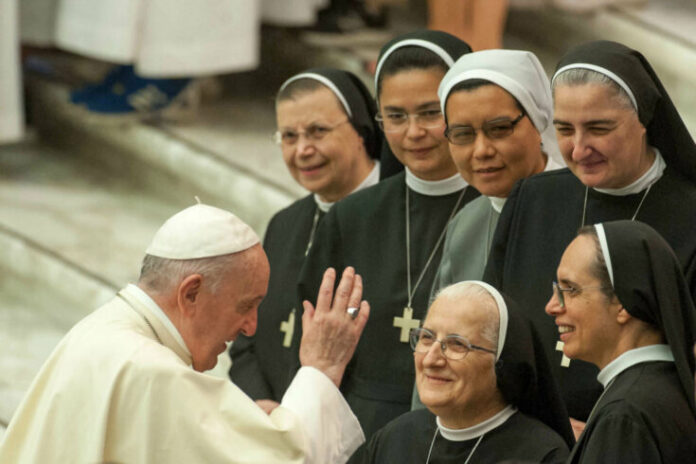
From the very beginning of his papacy, Pope Francis has sent the message that women matter as much as men in the life of the church. During a plane interview in November 2022—his favoured setting for breaking free from the scripted confines of the Vatican—he stated a “society that does not give women the same rights as men will become impoverished.”
Stories this good should be paywalled—but they’re not. Sign up for The Walrus newsletter and get trusted Canadian journalism straight in your inbox.
By checking this box I consent to the use of my information for emails from The Walrus.*Submit
But to better appreciate Francis’s understanding of women and their role in the church, we first need to step back and consider the role of the laity in the church. Women and men who are not clerics (deacons, priests, and bishops) constitute the laity and are a formidable majority of the global membership. The problem is that only half of the laity feel that they are valued for something beyond their baptism. For women, it is largely their motherhood and devotionalism that seem to earn the church’s respect, leading to the perception that, at least at ground level, they are second-class citizens in the church.
Francis knows that allowing females to serve on the altar, read at Mass, and serve in canonical tribunals is insufficient: more needs to be done, and therein lies the trap. From the outset of his papacy, Francis has been clear that the teaching of his predecessors—Paul VI, John Paul II, and Benedict XVI—on the exclusion of women from the priesthood remains in force. He cannot do otherwise. In an airplane interview returning to Rome from a World Youth Day event in 2013, he was adamant about respecting the role of women, at the same time insisting that church teaching on women and priesthood is not negotiable: “On the ordination of women as priests, that door is closed.”
At the heart of the debate for the ordination of women are cultural and theological concerns that can’t be reduced to a simple formula of human rights and equity. These ordinations would constitute a dogmatic shift. Approving such ordinations would rupture the unity of the Catholic Church, and no pope is going there, Francis included.
Popes have been fretting about this question since the 1970s, when the push for greater involvement of women in ministry began to be heard in the Vatican. Biblical, historical, and theological scholars were raising issues around women in the early church that were previously unexplored. And other Christian denominations—the Anglican Church specifically—were wrestling with the challenge of female ordination, forcing Rome to react.
And react it did. Pope Paul VI instructed the Pontifical Biblical Commission to study the question. The commission concluded that there may be reasons for the continued inadmissibility of women to the presbyterate but such a justification cannot be grounded in scripture. Not the answer Paul was looking for. One of the members of that commission, the Canadian Jesuit biblical scholar David Stanley, told me that the unanimity of the commission shook the pope. When Pope Paul moved ahead with the publication of a formal document closing discussion on the matter, Stanley resigned from the commission.
That formal document, Inter Insigniores, issued on January 27, 1977, left little uncertainty about the church’s definitive thinking: NO. This Declaration on the Question of Admission of Women to the Ministerial Priesthood affirmed that the “Catholic Church has never felt that priestly or episcopal ordination can be validly conferred on women” and proceeded to make the case on the basis of several considerations: the priest acts in persona Christi, and Jesus was male; Jesus did not call women to be apostles; the church’s practice has been secured by a constant tradition in both the East and the West. The document includes, not without sympathy for those who will be disappointed by its judgment, that women who express a desire for the ministerial priesthood are doubtless motivated by the desire to serve Christ and the church.
It is not surprising that, at a time when women are becoming more aware of the discrimination to which they have been subjected, they should desire the ministerial priesthood itself. But, for the Church, the priesthood does not form part of the rights of the individual. It is of a higher order.
If the pope and his doctrinal officials thought this would resolve the matter, they were quickly enlightened otherwise. John Paul II, especially in his 1994 Ordinatio Sacerdotalis, sought again to close down all debate on the matter as it was futile, contra-ecclesial, and divisive: “I declare that Church has no authority whatsoever to confer priestly ordination on women and that this judgment is to be definitively held by all the Church’s faithful.”
For John Paul II, because the matter “pertains to the Church’s divine constitution itself” and is not a disciplinary or legal issue, the church’s inability to ordain women to the priesthood is indisputable. Except, for many in the church, it was not, and whatever flames the pope intended to douse were persistent and are still fiercely aglow. Hence, Francis’s dilemma. Church authorities have great difficulty advancing an argument that simply stands the test of enduring credibility. The Vatican, prior to issuing Ordinatio Sacerdotalis, tried to enlist prominent prelates to take a stand that would support the church’s unalterable position and, in doing so, advance some new and convincing argumentation.
One of the prelates approached was Gerald Emmett Cardinal Carter of Toronto, a powerful churchman, much respected in the corridors of corporate and political power, feared if not loathed by Catholic dissidents, influential in the Vatican especially in matters of finance, capable of dominating the Canadian national hierarchy by sheer dint of his outsized personality. Rome saw him as the right man for the job of selling the church’s increasingly unpopular position.
And so, in 1983, Do This in Memory of Me: A Pastoral Letter upon the Sacrament of Priestly Orders was issued by the cardinal’s office, and controversy erupted. This pastoral letter repeats the position of every pope who has spoken on the subject. Theologians disparaged its arguments, feminist activists lamented its tired repetition of old nostrums, and other Canadian bishops looked for cover.
Carter strenuously defended his work through interviews, sermons, and public addresses. Still, the issue did not go away. Instead, it intensified. Roman Catholic women were ordained, and Rome declared their ordinations illicit and invalid and excommunicated both the women priests and those who took part in the ceremonies. Debates in the academy and in learned publications refused to be silenced. Women organized to champion causes that caused Rome more than a little discomfiture. Religious orders of women balked at Roman efforts to suppress free discussion. Sympathetic bishops and priests who defied the Vatican were censored and disciplined.
This is the state of the art that Francis inherited. Although many Catholic women reconfigured their organizations and goals to shift away from ordination as their sine qua non to broader issues of women’s equality in the Catholic Church as a consequence of Rome’s intractability, the issue of ordination centred on the potentially achievable goal of women as deacons rather than the priests. In addition, global awareness of other pressing issues for Catholic women was in the ascendant—human trafficking, domestic violence, migrant women and children—and, as a consequence, strictly ad intra ecclesial issues waned.
But did not disappear.
While the scholars are studying women as deacons, and commissions are formed seemingly ad infinitum, Francis has moved decisively on the empowering of women in the highest echelons, with his Predicate Evangelium (Preach the Gospel), an apostolic letter promulgated in 2022. This document radically reconceives, renames, and restructures the Vatican Curia, allowing laywomen and laymen to exercise leadership positions in the various departments where they would have served at only a secretarial or consultancy level, if at all. With this structural innovation, Francis has moved the laity to the very centre of power.
This may not be the solution people want. Francis is convinced that women can bring to the church gifts that do not require clerical status, that the struggle to access holy orders is misconceived as the varied ministries exercised by women are unique to them and do not require ordination oils. In an interview with America in 2022, Francis insisted that the fact that women cannot “enter into the ministerial life is not a deprivation.”
Read it all in The Walrus


